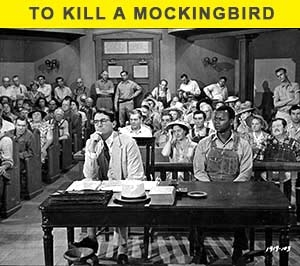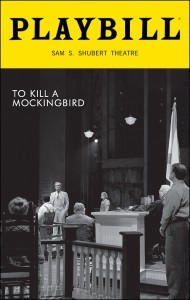BY AAGD STAFF
(July 14, 2019) This explosive Broadway play is packing in the seats at the Shubert Theatre in New York City. It is a swift take on Jeff Daniels towering figure of Atticus Finch in Aaron Sorkin’s effective adaptation of Harper Lee’s novel ” To Kill A Mockingbird.” The story is told by the little six-year-old girl Jean Louise Finch nicknamed Scout. She is a rebellious girl who has tomboy tendencies. The storyline is based in Maycomb, a small town in Alabama in the 1930s where Scout lives with her elder brother Jem, and her father, Atticus, who is widowed.
With a running time of 2hours, 35 minutes, audiences will see against all odds how writer Aaron Sorkin has accomplished this stage-worthy version of Harper Lee’s classic American novel “To Kill a Mockingbird.” Directed by Bartlett Sher, the moving, suspenseful performance reflects a superb casting genius. Sometimes funny, most-times predictive, the heart and soul of the play is smartly crafted and follows the narrative of the novel to a tee. It does an excellent job reflecting how family and justice interact in a society filled with racial conflict.
Scout, Atticus’s precocious 6-year-old daughter and the narrator of the story reveals the intricate delicacies of relationships during a period that demands change. Just as it’s parent novel, the stage play will warm your soul and stir your conscience with reflections of how inequality and a lack of self-worth create a world that dehumanizes the less fortunate.
For the most part, these protests have to do with Lee’s liberal and historically accurate use of “the n-word.” (Although it’s startling to hear the word used so often on a Broadway stage, the producers earn points for refusing to sanitize the script.) But broader issues of race and class also continue to fuel complaints. Lee based her warm-hearted but wide-eyed bildungsroman on her own childhood growing up in the segregated Deep South during the Depression.
The judgment theme is depicted in the circumstances that befell Tom Robinson, a poor African American field attendant who is accused and put on trial for rape. He was charged with trying to rape a white woman Mayella Ewell. Atticus is appointed by Judge Taylor as Robinson’s defense against the disapproval of many of the town’s citizens. Despite the apparent evidence that proves Tom’s innocence, the jury convicts him. The racist nature of the white supremacy society places all odds against Tom
“Mockingbird,” although beloved all over the world, has always been a headache. To be sure, it sold 50 million copies when it was published in 1960, won the most prestigious of literary prizes, inspired an Academy Award-winning film starring Gregory Peck, and is taught in countless school classrooms all over the country. Nonetheless, the novel is constantly under attack by religious, civic, and parents’ groups demanding that it be removed from school libraries and classroom curriculums.




